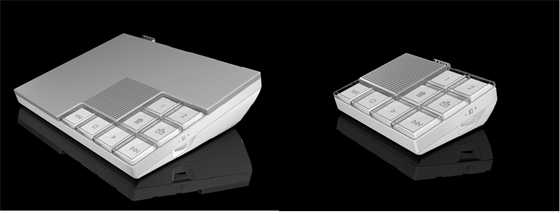An ambitious and long awaited new consumer VOIP startup – Ooma – launches on Thursday morning. Much like Vonage and the ill-fated SunRocket, Ooma allows consumers to use their normal phones to make and receive telephone calls, but at drastically reduced prices.
Vonage provides unlimited calling in the U.S. and Canada for a flat $25/month. Ooma, however, is using an innovative peer-to-peer architecture to significantly reduce their cost overhead. Because of that cost reduction, they’re charging for hardware only. Calls in the U.S. are free, and will be forever.
That doesn’t mean there’s no cost to the consumer, though. You still have to get your hands on the hardware, which starts at $399, and have a broadband Internet connection. That buys you a base hub. You plug broadband ethernet into one end, and a normal phone into the other, and you’re all set.
If you buy additional units, called Scouts, you can wire your entire house with Ooma. That is another distinct advantage over Vonage, which only allows a single phone to be plugged into the device. Spread the Ooma Scouts around the house, plugging one end into a normal phone jack and connecting it with a normal phone. It’s then part of the Ooma system and all calls will be free.
Instead of using normal exchanges to terminate calls like Vonage does, Ooma routes calls through the phone lines of other users if it can. That saves them the termination fee on the call and eliminates their largest marginal cost. That does mean that if you have a normal phone line (its not required to use Ooma) it will be used by other Ooma users, but it isn’t something you’d ever notice because your inbound and outbound calls are routed around it. And in the event you call 911, any phone call using your line is immediately broken and you are put right through. If there are no Ooma user within twelve miles of where your call is being terminated, Ooma uses the normal phone system. From the caller’s perspective, its all invisible.
The Ooma hardware is both beautiful and functional. Answering machine functionality is built in to the Hub and Scout devices via physical buttons. Every Ooma account also includes two lines, and either can be accessed from either phone. A speaker phone is also built in.
Ooma isn’t just making money on the hardware. They’ll be adding additional for-pay features over time. One of the most interesting is ringtones, allowing people to have customized tones for incoming calls. That’s generally considered a cell-phone only feature. I can imagine other cell-phone type services being added over time as well, and possible Ooma branded handsets.
If you choose to keep your normal phone line, I’d recommend changing your calling plan to the most basic, least cost choice. It’s basically a 911 backup in the event of an emergency.
Ooma has a very deep management team and board of directors, and has raised $27 million over two rounds of financing.
I had the opportunity to interview founder and CEO Andrew Frame and Creative Director Ashton Kutcher (yeah, the actor) a couple of days ago. Kutcher is actively engaged in the business – part of his work will consist of creating a viral video series to promote the product. The podcast is up at TalkCrunch. In addition to Ooma, Ashton and I go on a brief detour and talk about the iPhone (he likes it, mostly) and his upcoming movie with Cameron Diaz.
The product is in private beta currently and we’ll be giving away a few Oooma’s tomorrow. They go on sale in September.
